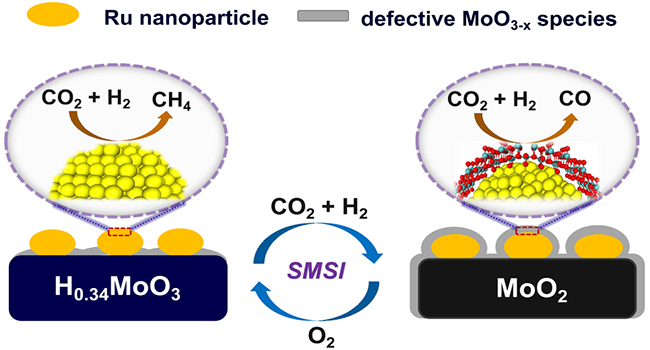Strong Metal-Support Interaction (SMSI) effect, which often happens upon thermal treatment of supported metal catalysts at high temperatures, is important in heterogeneous catalysis. It is usually used to explain the morphology evolution and catalytic mechanism at the interfaces between metal and active oxide supports.
Recently, a research team led by Prof. FU Qiang and Prof. BAO Xinhe from the Dalian Institute of Chemical Physics (DICP) of the Chinese Academy of Sciences (CAS) found that SMSI state can be constructed in a Ru-MoO3 catalyst by CO2 hydrogenation reaction gas and at low temperature of 250°C, which favors the selective CO2 hydrogenation to CO.
This work was published in Journal of the American Chemical Society on March 8.

Overturning CO2 hydrogenation selectivity with high activity via reaction-induced strong metal–support interactions (Image by XIN Hui
The researchers evaluated the mixed metal oxide catalyst, 1.9 wt% Ru-Mo-Ox, in CO2 hydrogenation reaction without pre-reduction. They found that during the reaction, Ru nanoparticles facilitated the reduction of MoO3 to generate active MoO3-x overlayers due to H-spillover, and migrated onto Ru nanoparticles and formed the encapsulated structure of Ru@MoO3-x.
The formed SMSI state changed 100% CH4 selectivity on the fresh Ru particle surfaces to above 99.0% CO selectivity with excellent activity. The encapsulating oxide layers could be removed via O2 treatment, switching back completely to the methanation reaction. Moreover, they found that the interface confinement between encapsulating Mo oxide overlayers and Ru nanoparticles could stabilize the defective
This work suggests that the encapsulation of metal nanocatalysts can be dynamically generated in real reactions which helps to gain the target products with high activity.
This work was supported by National Natural Science Foundation of China, Strategic Priority Research Program of CAS, Liaoning Revitalization Talents Program, and the Dalian National Laboratory for Clean Energy Cooperation Fund. (Text by XIN Hui)